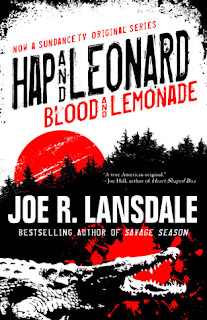From the back cover
"Hap Collins is a complicated man. He looks like a good ‘ol boy, but his politics don’t match. After way too many jobs, Hap has discovered what he’s best at: kicking ass. Vietnam veteran Leonard Pine is even more complicated: black, Republican, gay—and an occasional arsonist. As childhood friends and business associates, Hap and Leonard have a gift for the worst kind of trouble: East Texan trouble.
"Joe R. Lansdale’s popular Texan crime-fighting duo are immortalized in this collection of new Hap and Leonard short stories and tall tales. Hap and Leonard: Blood and Lemonade follows the exploits of the early years of these beloved characters. Many of these intertwined stories appear for the first time."
"Joe R. Lansdale’s popular Texan crime-fighting duo are immortalized in this collection of new Hap and Leonard short stories and tall tales. Hap and Leonard: Blood and Lemonade follows the exploits of the early years of these beloved characters. Many of these intertwined stories appear for the first time."
Overall review
Excellent,
entertaining, timely and darkly hilarious anthology that fills in a lot of tales
about Hap Collins’s youth, many of which feature Leonard Pine, his longtime
friend. Many of the stories are above average – even haunting, in some cases –
and all are worth reading.
Story by story review
1.) “Parable
of the Stick”: Hap and Leonard discuss the pros and cons of Old School
schoolyard rules, over-parenting and schoolyard scuffles.
2.) “Tire Fire”: Hap tells the tale of the first time he met Leonard at
a late night, backwoods fighting ring.
3.) “Not Our Kind”: In 1968, a young Hap and Leonard encounter racist,
homophobic bullies. They also glimpse a scene from their possible future. This
story also appeared in the 2016 anthology Hap and Leonard.
4.) “Down By the Riverside”: Hap recalls the day he discovered a
childhood friend was less than honorable – a day that has tragic
echoes. This is one of my favorite entries in this collection.
5.) “Short Night”: Hap and a friend with a secret hang out.
6.) “The Boy Who Became Invisible”: Originally published in the Hyenas novella and the Hap and Leonard anthology, “Boy” is told from Hap’s first-person
perspective. In it, he looks back on an unfortunate childhood friend (Jesse) whose hard life leads to some brutal choices. The interaction between Hap and
Jesse provide an effective heart punch to this timely, you-can-guess-where-it’s-going
piece.
7.) “Blood and Lemonade”: During Hap’s boyhood, he and his mother help a
black boy (Nathan) find his family – it proves to be an unexpected lesson for
Hap. This is one of my favorite entries in this collection.
8.) “In the River of the Dead”: Hap and Leonard – seventeen and fishing at
the time of this tale – are menaced by torture-dispensing rednecks. This is one
of my favorite entries in this collection.
9.) “Stopping for Coffee”: An adolescent Hap goes to a coffee shop where
a sudden conflict between older racists and youthful liberals takes place. The
ending to this is disturbing and effective because of what is not shown.
10.) “Apollo Red”: Hap’s father stands up to a rich arrogant man and – in
doing so – stirs up trouble.
11.) “Coach Whip”: Wise work about snakes and people.
12.) “The Bottom of the World”: In 1960, Hap’s father tells his ten
year-old son a spooky story about the Water Witch, an undead river woman.
13.) “Squirrel Hunt”: Twelve year-old Hap and his father discover a dead
body in the woods. Good tale about justice.
14.) “The Oak and the Pond”: Hap reminisces with Leonard about one of his
old hangout places, a site since razed. This is a nostalgic and melancholic
piece.

No comments:
Post a Comment